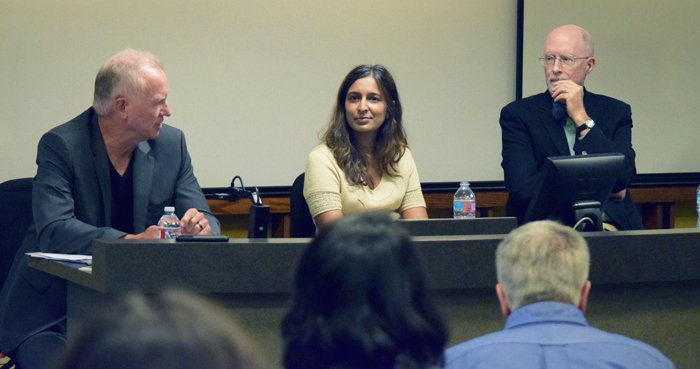SWLAW Blog | Campus

October 27, 2016
The U.S. Supreme Court: Cause or Cure for Polarized Government? Three Professors Debate the Issues
The upcoming presidential election will likely have a major impact on the U.S. Supreme Court, which is currently divided ideologically. On October 26, Professors Warren Grimes, Joerg Knipprath and Gowri Ramachandran discussed a range of issues, from the Supreme Court’s power to influence constitutional law to its effect on a polarized political climate. The event was co-presented by Southwestern’s chapters of the American Constitution Society and the Federalist Society.
One question dealt with how to prevent the current state of the court, which has split on several key decisions caused by a vacancy on the bench. Professor Ramachandran said, “The first goal would be for the court to be less politicized, because that’s the reason that the senate has refused to act on President Obama’s nomination [of Judge Merrick Garland]….Everyone admits, maybe a little more openly than they used to, that the ideology and politics of the Supreme Court justices influences how they decide the cases. So everyone knows it matters a lot.”
Professor Knipprath said, “I don’t see it as a bad thing that there’s deadlock in government, gridlock… You’re not going to get split opinions on non-controversial matters….” To him, the bigger issue is, “Mainly, why fundamental constitutional questions ought to be decided by a bare majority of unelected elitists?…The problem is that the Supreme Courts is able to act basically as a roving constitutional convention.”
Although the professors shared widely ranging views on everything from gerrymandering to the number of cases the court takes on to whether justices should be appointed or elected, all three agreed that term limits might help de-politicize the court.
Professor Grimes talked about a suggestion that has been circulated in academia to create staggered 18-year terms for nine justices so every president would have two appointments per four-year term. “Regular re-invigoration of the court by new people appointed on a systematic basis will help,” he said. “There’s no way we can eliminate politicization of the court, but we can lessen it by having a regular system for it.”
You can watch this discussion, in its entirety, here.
To view more photos of this debate, visit Southwestern’s Flickr page.